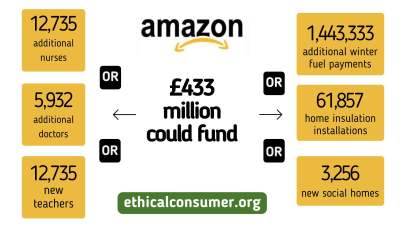Why Amazon's tax avoidance matters
We think there are two reasons why Amazon's tax avoidance is important.
1. The UK government needs revenue to rebuild public services
In 2024 UK voters dramatically rejected any further hollowing out of public services. The new government needs new sources of revenue to help rebuild the NHS, schools and other public services. (Remember the £22bn black hole?)
Tax from corporations like Amazon is one form of income for the government to use for public services.
2. Amazon is increasingly replacing existing retailers who were paying tax
Amazon has been talking publicly about how much it invests in the UK and is 'contributing to the UK economy'.
And you can't drive down a motorway these days without seeing another giant Amazon fulfilment centre popping up somewhere.
The trouble with Amazon's argument is that, for each of these new Amazon warehouses, 100 shops will have closed down somewhere else – likely on a high street near you.
It’s not that people are buying more TVs, shirts or hand blenders – it's just that they are buying them from Amazon instead of the retailers on the high street.
Amazon's 'tax efficient' business model is able to undercut the shops we used to use and which didn't 'offshore' their payments to Luxembourg.
The net effect of this is to reduce corporation tax, not only because of Amazon's tax approach but also because of the loss of smaller retailers which were paying tax.
Amazon's retail and tax methods therefore hollow out the tax base that used to support the public services we all need. Indeed, it seems puzzling to us that Amazon can claim to be growing the economy this way when it looks to us that it might be contracting it instead.






